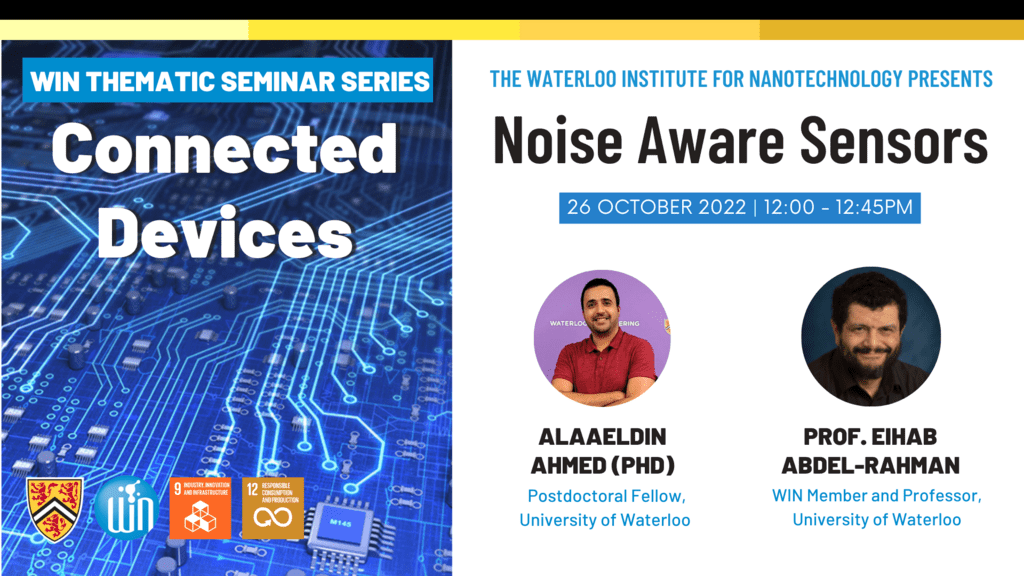Events
Filter by:
Office Hour with Craig McQueen (BASc ’93), VP at Softchoice, on “Take charge of your career in tech”
Waterloo Engineering students and alumni are invited to participate in an exclusive virtual Office Hour with Waterloo Engineering alumni Craig McQueen (BASc 1993, Systems Design Engineering), vice president of digital acceleration at Softchoice, as he shares tips and advice on taking charge of your career in tech.
Office hour with Roy Unny (BASc ’93, MASc ’96), Technical Director on Transportation Lessons from Australia
A systems design engineer’s view of rail as a complex socio-technical system: Lessons from Australia
Waterloo students and alumni are invited to participate in an exclusive in-person Office Hour with Waterloo Engineering alumni Roy Unny (BASc ’93 MASc ’96, Systems Design Engineering), a leader in transport and infrastructure based in Melbourne, Australia.
Grad Seminar: Noise-Aware Sensors with Dr. Alaaeldin Ahmed
Please join us on Thursday, November 17, 2022, from 11:00 a.m. to 12:00 p.m. in E7-7363 (Faculty Hall) for Dr. Alaaeldin Ahmed’s seminar on “Noise-Aware Sensors”. Dr. Ahmed is a post-doctoral fellow currently working with Professor Abdel-Rahman.
Abstract:
Intrinsic noise processes impose fundamental limitations upon the signal-to-noise ratio (SNR) of MEMS & NEMS sensors.
Grad Seminar: System Design of Mid-/Far- Infrared Photothermoelectric Detectors
Abstract
Self-powered, flexible, and uncooled mid-wavelength infrared (MWIR) detectors based on photothermoelectric (PTE) mechanism are promising in the next-generation wearable Internet of Things (IoT). The photovoltage of PTE detectors is controlled by the Seebeck coefficient and temperature difference under local or global illumination. Previous PTE detectors show a less outstanding performance enhancement, and rare papers report their potential applications.
Grad Seminar: Muscle Torque Generator Model For A Two Degree-of-Freedom Shoulder Joint
Abstract
Muscle Torque Generators (MTGs) have been developed as an alternative to muscle-force models, reducing the complexity of muscle-force models to a single torque at the joint. Current MTGs can only be applied to single Degree of Freedom (DOF) joints, leading to complications in modeling joints such as the shoulder. Therefore, this project aimed to develop, for the first time, an MTG model that accounts for the coupling between 2 DOF at the shoulder joint.
Grad Seminar: Unsupervised learning for coherent structure identification in turbulent channel flow
Abstract
Coherent structures (CS), i.e., regions of flowing fluid that exhibit significant spatio-temporal coherence, have long been observed in turbulent fluid flow. These CS offer an opportunity to gain insights on fluid behaviour by bypassing the non-linear complexities associated with turbulent flows. Historically, the identification of CS in turbulent flows has involved using manual thresholds to label regions of interest.
Grad Seminar: Exploring Cognitive Work Analysis models and visualizations on bedside physiologic monitor in neurocritical care
Abstract
Moderate to severe traumatic brain injury is the leading cause of injury-induced death and disability. For patients with traumatic brain injuries (TBI), in the first 48 hours, 48% of patients show a clinically relevant neurological worsening and therefore, it is critical that clinicians can identify neurological worsening quickly and act on treatment accordingly.
Grad Seminar: Open-loop Transient Atomic Force Microscopy
Abstract
The Atomic Force Microscope (AFM) is an instrument for measuring, in fact “seeing”, phenomena at nanoscale (10−9m) and all the way down to the atomic scale (<10−10m). It was borne out of a need to observe physical reality below the resolution of optical microscopes. Invented in 1986 by Binnig, it has aided scientists, researchers, and engineers spanning many scientific and industrial domains. The typical sensing apparatus of the AFM is a very sharp tip (a few atoms wide) attached to the free-end of a fixed-free micro-beam.
Grad Seminar: Sea ice classification with dual-polarized SAR imagery: a hierarchical pipeline
Abstract
Sea ice mapping on synthetic aperture radar (SAR) imagery is important for various purposes, including ship navigation and usage in environmental and climatological studies. Although a series of deep learning-based models have been proposed for automatic sea ice classification on SAR scenes, most of them are flat N-way classifiers that do not consider the uneven visual separability of different sea ice types. To further improve classification accuracy with limited training samples, a hierarchical deep learning-based pipeline is proposed for sea ice mapping from SAR.
